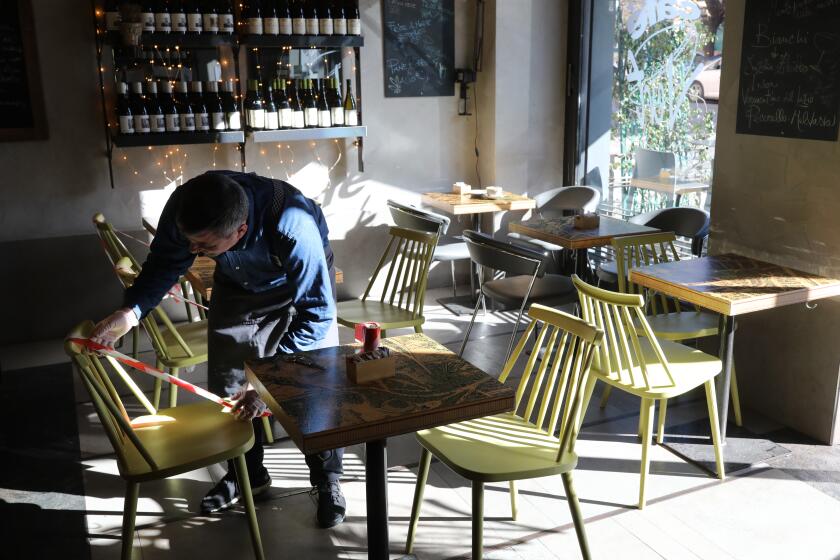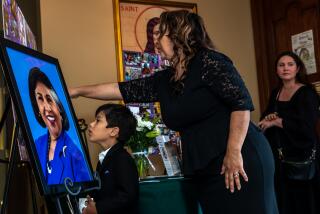This mother and daughter were inseparable. They died from coronavirus on the same day
- Share via
Carolina Tovar and Letty Ramirez were an inseparable mother-and-daughter duo — the twin matriarchs of their family.
They were often standing side by side in the kitchen, sharing traditional recipes that they would serve their children. In the evenings, they watched classic Mexican films, the ones starring Vicente Fernandez. They got their nails done together and talked about everything.
As Tovar aged, Ramirez was her most trusted caregiver. She guided her in and out of hospitals for her weekly dialysis. She was always there.
But in March, breathing difficulties brought both women to the emergency room. This time, they would not leave together, hand in hand, as they had done so many times before. On April 3, mother and daughter died from COVID-19, hours apart in separate hospitals.
The coronavirus outbreak is now a pandemic, but officials won’t give up on trying to slow the virus’ spread. Here’s why containment is still important.
A tight-knit family whose members normally find comfort in one another’s presence is now learning to adjust to life without two mothers. As they grieve, some family members are also recovering from COVID-19 themselves and struggling with the financial difficulties that have come with the health crisis.
“It felt like somebody kicked my stomach,” said 28-year-old Alexis Ramirez, Letty Ramirez’s eldest daughter. “It happened so quickly, nobody could believe it.”
The week before the women were hospitalized, they spent their evenings together as they had always done. Ramirez, 54, had a dry cough, mostly in the mornings, but otherwise felt well enough to go to work as a mortgage broker.
But on March 19, her oxygen levels fell, and her daughter rushed her to the emergency room. Alexis dropped her off at St. Jude Medical Center in Fullerton, feeling guilty that she couldn’t stay by her mother’s side because of the hospital’s isolation requirements.
Tovar, 86, who had seemed in good health, fell ill shortly afterward and was admitted to the same hospital days after Ramirez. Letty Ramirez’s husband was also hospitalized with COVID-19 symptoms that weekend.
Each day, family members updated one another on the status of Tovar and Ramirez via FaceTime. They were hopeful. Tovar had been through hospitalizations and had always come out strong. Ramirez was young and seemed to have a lot of life left to live.
How can the new coronavirus affect people so differently — killing some while leaving others blissfully unaware that they have been infected at all?
At first, it seemed as if Ramirez would get better. She was able to talk to her daughter over the phone and told her she’d be home in just a few days. Within hours of that call, she was put on a ventilator and transferred to Providence St. John’s Health Center in Santa Monica where doctors hoped better equipment would give her a chance.
Doctors told her family they had diagnosed Ramirez with diabetes and kidney failure, something they hadn’t been aware of before. She also suffered from asthma.
During the Ramirez family’s next FaceTime call with her, Letty Ramirez was only able to open her eyes. She looked like she might have wanted to say something, but Alexis couldn’t understand.
“I just told her, ‘Mom, please keep fighting. We still need you here. We want you to come home.’”
At St. Jude’s, her grandmother began speaking of death.
“She was just telling us, ‘I gave it my all. I’m ready to go now,’” said Maribell Tovar, one of her daughters.
On April 2, when doctors informed the family Tovar would need to be put on a ventilator, another one of Tovar’s daughters negotiated her way into her hospital room. She called the family on FaceTime and, together, they decided to respect Tovar’s wishes not to be put on a ventilator.
Through FaceTime, about a dozen of Tovar’s children and grandchildren spent the night with her, their voices enveloping her as she let out her last breath. Letty Ramirez was one of few missing.
“She was ready, and we prepared ourselves too,” Alexis said of Tovar. “We were all still talking to her, telling her we loved her, that we’re going to be OK and she doesn’t have to fight anymore.”
It was a painful moment for the family to share, but one that wasn’t wholly unexpected, given her age and history of kidney failure.
She married her husband, who recently died from cancer, when she was 13 in Zacatecas, Mexico, and later immigrated to California. She had six daughters, two sons and many grandchildren who would take her on trips to Las Vegas and the beaches of Rosarito, Mexico, and host parties year-round.
The parties were often hosted by Letty Ramirez at her Rowland Heights home. She and her mother made enchiladas, mole, tamales. Ramirez’s green pozole was a family favorite.
“She was the one that kept the family together on holidays,” said Ramirez’s niece Vanessa Padilla.
Tovar was as caring as her daughter was.
“My mom, she was just a sweet lady,” Maribell said. “She was very giving and never criticized you. She was the best mom.”
“Mama Carolina was the matriarch of the family,” said Art Aguilar , one of her grandsons, in an email. “She led by example, time after time, teaching and inspiring love, trust, empathy, courage, tolerance, kindness, and fairness without ever preaching it.”
“She loved to make sure we were OK,” Alexis said. “She would love to feed us. If you didn’t eat all your plate, she would be like ‘Why are you starving yourself?’”
The family hadn’t had time to recover from the news of Tovar’s death before Alexis got a call from a doctor that evening. Her mother wasn’t improving. Her toes were black. Any more time on the ventilator would not help her, the doctor told her.
Alexis made the decision to remove her from the machines, and she died within minutes, just before 6 p.m. Letty Ramirez never learned about her mother’s death. Alexis called her family again on FaceTime, and together, they cried.
“It was just hard that we couldn’t be together to console one another,” Alexis said. “We couldn’t be there for [my mom] like she was there for us. We felt so powerless.”
Alexis said the last couple of weeks have left her feeling numb and overwhelmed. The older of her two brothers also tested positive for the virus and she believes she and her youngest brother were also infected.
She is scrambling to look for a job after she was laid off days before her mom’s death. Ramirez was her family’s primary provider. Alexis’ 18- and 23-year-old brothers work part time and go to school.
Her 76-year-old father, who is retired, was released from the hospital after a week and is recovering from the virus. But he is struggling with the loss of his wife of 26 years. He refuses to speak to other family members and seeks the constant company of his children.
“She was the love of his life,” Alexis said. “He tells me, ‘What am I going to do without your mom?”
“In the end, Tia Letty, quite literally and figuratively gave her life for her mom,” Aguilar said, using the Spanish word for aunt. “How ironic that you could not separate these two women in life and that fate had made it so that they wouldn’t have to be separated after death.”
More to Read
Sign up for Essential California
The most important California stories and recommendations in your inbox every morning.
You may occasionally receive promotional content from the Los Angeles Times.














